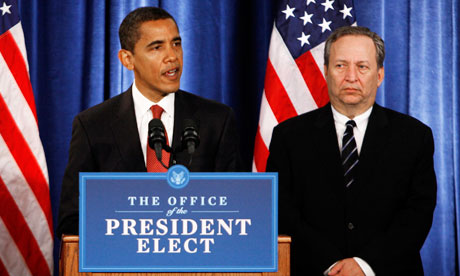
The recent departure of Larry Summers and other economic advisers to Obama is the sign of a profound malaise. It is the consequence of a deadlock. The U.S. lacks new ideas to get out of the crisis. The announcement of Mr. Summers’ departure coincided with the release of the official statement about the end of the recession, issued in June 2009 by the Business Cycle Dating Committee — a group of experts that belongs to the National Bureau of Economic Research — by chance.
However, the end of the crisis is still “invisible” in the job market and the public finds it difficult to believe. It was the longest recession since World War II — lasting eighteen months starting in December 2007. It was also the “deepest” from a jobs destruction standpoint. In declaring that the recession is well behind us, the committee is “not at all saying the unemployment rate, or anything else, has returned to normal.”
On the contrary, more jobs are still being eliminated than created. After June 2009, there was a net loss of 329,000 jobs over the following fifteen months. According to Robert Gordon, an economist at Northwestern University and member of the Business Cycle Dating Committee, “We could have nine-plus percent unemployment even through the next presidential election” at that rate. It is a very high and unusual level on record for the United States and its social consequences make it hard to govern. “To prevent this rate, we must take action right now,” Gordon concluded.
But how to take action? Larry Summer’s departure revealed the deadlock. Bill Clinton’s former Secretary of the Treasury is the symbol of an era characterized by a mainstream conviction among American leaders: the idea that globalization is “a game that everyone can simultaneously win,” in which the United States can make huge gains while China, India and Brazil are taking advantage of it. Today, this view is undermined.
In 2009, the number of American employees whose layoffs were a consequence of the foreign trade situation increased by 59 percent from the previous year. Those who found new jobs after a layoff have had to accept a salary that is about 20 percent lower than what they used to receive for their previous positions. Now, the American production of photovoltaic panels only represents five percent of the global markets: it is a technology that was invented 30 years ago by the United States but which is now in the thrall of China.
One view — Summer’s view — of the globalization described a world in which lost industrial jobs were offset by new and better paid service jobs. In order to measure up to the competition from emerging countries, the United States should have specialized in more and more advanced activities. Yet, export of technologies “made in China” or “made in Brazil” grew over the last few years. This situation explains the rising trade tensions between Washington, D.C. and Beijing, Obama’s pressure for a stronger renminbi and the protectionist inclination that unites both Democrats and Republicans in Congress.
The end of the “Summers era” is celebrated without any alternative strategy. The Republican Party presented its new plan: Pledge to America. It is a bunch of old ideas that have already been applied from Ronald Reagan to the Bush father and son, which include maintaining the tax cut for the richest taxpayers (annual income is above $250,000) who benefit from the lowest tax rate in the world (36.5 percent). Billionaire Warren Buffett said, “There’s class warfare, all right, but it’s my class, the rich class, that’s making war, and we’re winning.”
Inspired by the Nobel economics prize winner Paul Krugman, the Left of the Democratic Party would like to see another increase in public expenditures to sustain employment. But this strategy did not gather a consensus last year. Its supporters will only be a minority after the November elections.
Without any strategy, the Federal Reserve is the only protagonist getting ready to intervene. It reported that it can resume buying long-term Treasury securities at any time, which will entail a higher money supply. Unfortunately, a higher money supply does not mean that there will be more investments.
Companies are keeping 6.2 percent of their assets in the form of cash, a record high that has not been hit since the 1960s — difficulties in predicting the future and low trust do not encourage employment. Actually, the Fed’s presses will have some impact: the weakening of the dollar can boost exports. And it is the European economy that will bear the brunt.

Leave a Reply
You must be logged in to post a comment.